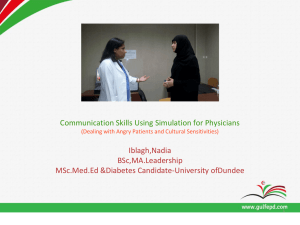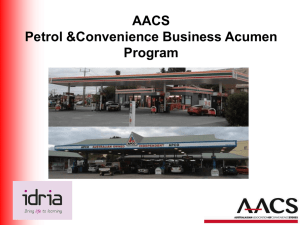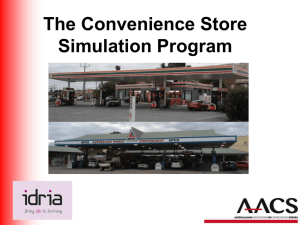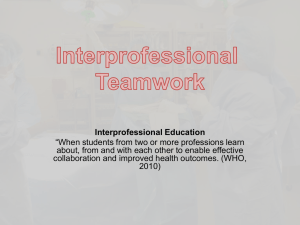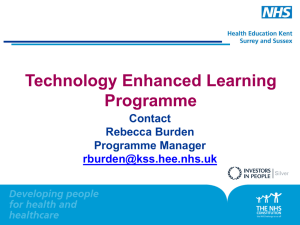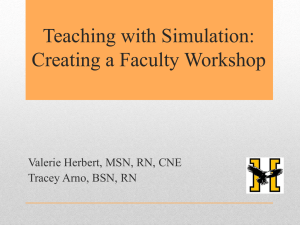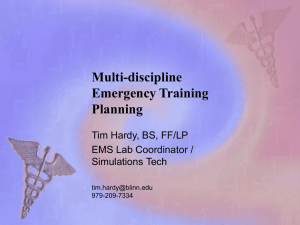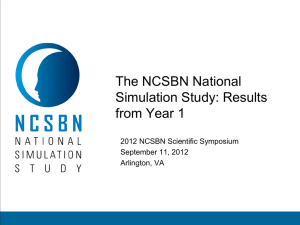Document
advertisement
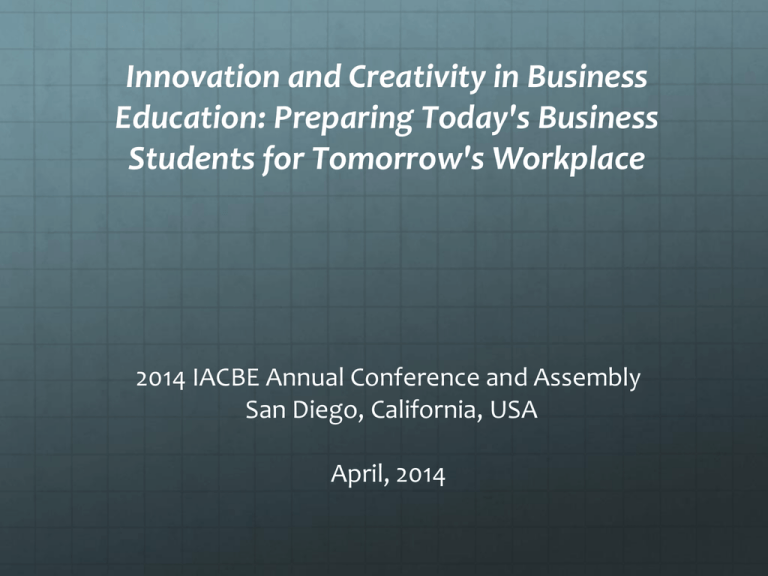
Innovation and Creativity in Business Education: Preparing Today's Business Students for Tomorrow's Workplace 2014 IACBE Annual Conference and Assembly San Diego, California, USA April, 2014 The Games Students Play: Using Business Simulations to Prepare Tomorrow’s Business Leaders Thomas D. Cairns, DBA, Fulbright Scholar, Associate Professor, Graduate School of Business, Azusa Pacific University Roxanne Helm-Stevens, DBA, Program Director Master of Arts in Management, Associate Professor, School of Business, Azusa Pacific University Cindy Richmond Peck, MA, Program Administrator, Undergraduate Programs, School of Business, Azusa Pacific University True or False True 1. Video games, hardware and accessories produces 4 times ($20B) the annual revenue of the NBA ($5B) False 2. The average age of a game player is 15. True 3. 72% of American households play computer or video games. True 4. 77% of gamers who play with others play at least 1 hour per week False 5. Boys under the age of 17 represent a significantly greater population of game players than women over the age of 18. True 6. 55% of gamers play games on their phones or handheld device. Let the Games Begin https://secure.videogamevoters.org/pages/top_10_gamer_facts/ Contents I. II. III. IV. V. VI. Executive Summary Background Literature Review The Simulation Research Study Conclusion Executive Summary Using Business Simulations to Prepare Tomorrow’s Business Leaders This study presents a comparison of student perception of simulation game strategy as a learning methodology as opposed to traditional teaching methodologies. Additionally, this research examines student perception of the effectiveness of simulation game strategy as a learning pedagogy. Finally, this study compares the data gathered from similar classes in the European Union and the USA. Introduction Since business simulation games (BSG) were first used in the 1950’s nearly 100% of business schools have adopted simulations in their undergraduate, graduate and executive education curriculum. Technology and access to the internet has contributed to this growth. However, the effectiveness of business simulations in teaching effectiveness ranks behind lectures, and case studies. This presentation will describe the implementation and effectiveness of business simulations to teach critical thinking, problem solving and decision making to undergraduate and graduate students in the traditional and online classroom. This presentation will include empirical measurements of the educational effectiveness of BSG’s to teach critical leadership and management skills. Brief Literature Review • Participants who used simulation performed significantly better than those who read from a text (Taylor & Chi, 2006) • Since 1962 Usage has Significantly Increased (71% to 98%) among AACSB schools (Faria, 1998) • Optimal teaching and learning occur when teaching styles align with learning styles. (Proserpio & Gioia, 2007) • Simulations support a team learning process, and enhance collaboration skills and overall understanding of the functioning of business organizations. (Lainema, & Lainema, 2008). • Respondents prefer collaborative and technology-rich learning and deemed games a valuable teaching method (Bekebrede, Warmelink & Mayer, 2011). • Transfer of learning may be associated with various methods of teaching the simulation and various aspects of student involvement in the simulation. (Mayer, Fraccastoro & Moss, 2011). Background In addition to the simulation, course assignments included lecture, reading, exams, and exercises. •Students participated in the simulation throughout the semester, with nine decision weeks. •Subjects covered in the simulation included: start-up decisions, marketing, operations, management, and accounting. Research Methodology Data was gathered in the Fall 2013 semester from two business undergraduate classes. Students Used the Same Textbook – Effective Management (Chuck Williams) . Both courses are required for business students. Students participated in the simulation through nine successive rounds of play. Introduction to Management and Teamwork (National University of Ireland at Maynooth ) Catalog Description: To develop an appreciation of the broad range of topics that influence the practice of management to include: theories of groups and effective teamwork; the development of management as a field of study and practice; the evolution of management thought; management functions, processes and practices; ethics and future challenges. BUSI 210: Principles of Management (APU) Catalog Description: Elements of planning, organizing, leading, and control are covered. Particular emphasis is given to organizing and actuating responsibility and authority, delegation, decentralization, the role of staff, linestaff relationship committees, board of directors, organization charting, formal and informal organization, communication, and reaction to change. Simulation: Functions of Management Determining the goals for the organization and the means for achieving them. Henri Fayol “Father of Modern Management” Monitoring progress toward goal achievement, taking corrective action as necessary Deciding who will do what, when, and where Inspiring and motivating workers to achieve organizational goals. Management is a Learned Behavior Simulation Learning Activities BizCafe Simulation Learning Objectives: Opportunity to learn the fundamentals of business by running a simple start-up enterprise Manage staffing and recruiting for a service business Learn about the impact of marketing and promotion Practice running the operations side of a small business Groups of 4 or 5 Understand how to read and utilize basic financial statements Discover the importance of customer satisfaction Students play the role of coffee shop manager making management, marketing, operations and accounting decisions. Students will compete with other groups, competing directly with each other. BizCafe Simulation Practice operating and managing a small business using an online simulation. Focus on learning in an applied way. Compete against the rest of the class. Develop a business by planning the following factors critical to every new venture: Management – Whom should I hire? What should I pay them? Marketing – What price should I charge? How do people learn about my business? Operations – What and how much should I purchase? What equipment do I need? Accounting- How do I keep track of money? The Simulation will be graded based on final cumulative results – (cumulative net income, customer satisfaction, brand awareness, quality, and employee turnover) - performance of the business. • The simulation consists of 9 rounds (weeks) with decisions due at the end of each round. • Each group prepared a brief report detailing different aspects of the simulation. Team Paper I. Introduction 1. 2. 3. Provide a brief background on the teams approach to Planning, Organizing, Leading and Controlling. Did the team behave according to the Team contract? Briefly discuss the rationale/justification for the following decisions? a. Management – Whom should I hire? What should I pay them? b. Marketing – What price should I charge? How do people learn about my business? c. Operations – What and how much should I purchase? What equipment do I need? d. Accounting- How do I keep track of money? II. Team Performance Assess the effectiveness of the team strategies and tactics using the final cumulative results of the business (cumulative net income, customer satisfaction, brand awareness, quality, and employee turnover). What worked? What did not work? What would you do differently if given the opportunity? III. Team Progress Using the pre and post results of the High Performance Work Team Questionnaire discuss the team’s strengths and weaknesses. Which categories helped the team achieve or fail to achieve your goals? What did you learn? Team Category Interactive Goals Resource Optimizing Conflict Management Interactive Leadership Activity Control Feedback Mechanisms Decision Style Flexibility Mutual Assistance Experimentation Self-Evaluation Long-Term Commitment Performance Influence Average Score (start) Average Score (end) Change +/- BizCafe Team Paper IV. Team Development Discuss how the team successfully overcame or failed to overcome the five dysfunctions outlined by Patrick Lencioni. Be specific and give examples. V. Team Effectiveness What do you believe contributed to your success or failure as a team. Be specific. Explain. VI. Applying Management Principles How did this simulation help you understand and apply the principles of management? The paper must be written in a professional business manner and tone and include a thorough insight and business analysis of the operations of the business. Each paper must be 7-9 pages in length and typed double-spaced. Papers must be turned in hard copy (including all graphs and excel spreadsheets). Team Presentation Reflect on the BizCafe experience and compare your decisions and outcomes with others in the class. You will present only the most important aspects of your experience. Assignments should be prepared in PowerPoint and will be presented to the entire class. Please keep the presentation to 5-7 minutes, but cover at least these points: • Highlights of your plan including your objectives and how you chose to achieve those objectives • Your café logo and advertisement/storefront (if applicable) • Number of servers employed and wages • Your financial performance, including a discussion of important items on your income statement and balance sheet • Key success factors in BizCafe • Important “take-aways” from the simulation experience Applying Strategy and Innovation to BizCafe Think Long-Term but Execute Short-Term 1)Using Porter’s Five Industry Forces, map the coffee shop industry a) Competitive landscape - Assess the character of the rivalry among competitors (degree of aggressiveness) b) Products, Operations and Technology 2)Review the framework of Direct Competition. a) How do market commonality and resource similarity interact 3)How can you create a sustainable competitive advantage (i.e., menu, pricing, atmosphere, etc.)? a) Improving efficiency and effectiveness b) Not possessed by many competing firms c) Extremely costly or difficult to duplicate d) Competitors cannot substitute or produce similar value). 4.What are your distinctive competencies and core capabilities? a) What restaurants are highly successful in our (local) market? What factors do you think account for their success? Have any of these restaurants been successful for more than five (5) years? …We asked ourselves, 'If Starbucks did not exist, what type of coffee experience would we create?“ - Howard Schultz Research Study Simulation Usage at AACSB Schools (Faria, 1998) • Sample Size (50% of AACSB members) • Since 1962 Usage has Significantly Increased (71% to 98%) • Highest Usage at Undergraduate Level • Highest to Lowest Usage (Bus. Policy, Marketing, Management, Finance and Accounting) • Approximately 25% of classroom time • Faculty ranked Lectures and Case Number 1 in Teaching Effectiveness (same as Simulation NonUsers) • Simulation Users ranked Simulations Number 1 in Teaching Effectiveness Business Simulations Are Alive and Growing Student Feedback from Simulation Experience Question 1 2 3 4 5 The class lectures and exercises were the most effective way to learn about management. 20% 57% 60% 36% 16% 7% 3% 0% 0% 0% The BizCafe simulation was the most effective way to learn about management. 26% 43% 46% 43% 16% 14% 10% 0% 0% 0% The textbook was the most effective way to learn about management. 13% 7% 30% 0% 23% 47% 30% 27% 6% 20% Did the simulation help you understand the challenges of running a small business? 40% 50% 46% 29% 6% 14% 7% 7% 0% 0% How satisfied were you with the simulation experience? 23% 43% 50% 29% 26% 29% 3% 0% 0% 0% Did the simulation increase your interest in studying management? 23% 38% 43% 38% 26% 15% 6% 8% 0% 0% Did your experience with the simulation contribute to your understanding the principles of management? 16% 31% 66% 69% 13% 0% 10% 0% 0% 0% Likert Scale 1. Strongly Agree 2. Agree 3. Slightly Agree 4. Disagree 5. Strongly Disagree Red – APU results Black – NUIM results Student Feedback from Simulation Experience Question APU NUIM 1. Start Up Decisions 16% 13% 2. Management 16% 7% 3. Marketing 46% 47% 4. Operations 26% 20% 5. Accounting 10% 13% In your experience with the simulation, which aspect did you learn the most from? Summary Simulation Experience at APU and NUIM (Cairns & Helm-Stevens, 2013) • Sample Size (120 Undergraduate Students) • Students Ranked Lectures Number 1 in Teaching Effectiveness • Simulation contributed to understanding the business challenges (79% satisfied to very satisfied) • Simulation increased interest in studying management (76 % satisfied to very satisfied) • Simulation contributed to understanding the principles of management (100% satisfied to very satisfied) • Students ranked Marketing as the Number 1 Learning Outcome Business Simulations Add to Learning Conclusion Our results show that students …………. although simple decision-makings skills can be acquired with traditional teaching methods, simulation games are more effective when students have to develop decision-making abilities for managing complex and dynamic situations. And, when the simulation is embedded into classroom assignments, such as, lecture, papers, and presentations. The class lectures and exercises were the most effective way to learn about management. 57% 60% A. Strongly Agree B. Agree C. Slightly Agree D. Disagree E. Strongly Disagree 36% 20% 16% Key: 7% 3% Maynooth, Ireland – Orange California, USA - Red 0% 0% 0% The BizCafe simulation was the most effective way to learn about management. 43% 46% A. Strongly Agree B. Agree C. Slightly Agree D. Disagree E. Strongly Disagree 43% 26% 16% 14% 10% 0% Key: Maynooth, Ireland – Green California, USA - Black 0% 0% The textbook was the most effective way to learn about management. 47% A. Strongly Agree B. Agree C. Slightly Agree D. Disagree E. 30% 30% 23% Strongly Disagree 27% 20% 13% 7% 6% 0% Key: Maynooth, Ireland – Orange California, USA - Red How satisfied were you with the simulation experience? 50% 43% A. Very satisfied B. Satisfied C. Somewhat satisfied D. Somewhat dissatisfied E. Very Dissatisfied 29% 23% 26% 29% 3% 0% 0% 0% Key: Maynooth, Ireland – Green California, USA - Black Did the simulation help you understand the challenges of running a small business? 50% 46% A. Strongly Agree B. Agree C. Somewhat Agree D. Disagree E. Strongly Disagree 40% 29% 14% 6% 7% 7% 0% Key: Maynooth, Ireland – Orange California, USA - Red 0% Did the simulation increase your interest in studying management? 43% A. Strongly Agree B. Agree C. Somewhat Agree D. Disagree E. Strongly Disagree 38% 38% 23% 26% 15% 8% Key: Maynooth, Ireland – Green California, USA - Black 6% 0% 0% Did your experience with the simulation contribute to your understanding the principles of management? A. Strongly Agree B. Agree C. Somewhat Agree D. Disagree E. Strongly Disagree 66% 69% 31% 16% 13% 10% Key: Maynooth, Ireland – Orange California, USA - Red 0% 0% 0% 0% In your experience with the simulation, which aspect did you learn the most from? A. Start-up decisions B. Management C. Marketing D. Operation E. Accounting 46% 47% 26% 20% 16% 16% 13% 13% 7% Key: Maynooth, Ireland – Green California, USA - Black 10% Discussion of Findings “I attended your Introduction to Business Management Class last semester, and it was one of my favorite classes (Kanga Brew). I think I learned the most because you gave us a hands on opportunity to really learn the types of choices we will have to make in the business world.” -student quote Bibliography Bekebrede, G. G., Warmelink, H. G., & Mayer, I. S. (2011). Reviewing the Need for Gaming in Education to Accommodate the Net Generation. Computers & Education, 57(2), 1521-1529. Cronan, T., Leger, P., Robert, J., Babin, G., & Charland, P. (2012). Comparing Objective Measures and Perceptions of Cognitive Learning in an ERP Simulation Game: A Research Note. Simulation & Gaming, 43(4), 461-480. Lainema, T., & Lainema, K. (2008). Advancing Acquisition of Business Know-How: Critical Learning Elements. Journal Of Research On Technology In Education, 40(2), 183-198. Leemkuil, H., & De Jong, T. (2012). Adaptive Advice in Learning with a Computer-Based Knowledge Management Simulation Game. Academy Of Management Learning & Education, 11(4), 653-665. doi:10.5465/amle.2010.0141 Mayer, B. W., Dale, K. M., Fraccastoro, K. A., & Moss, G. (2011). Improving Transfer of Learning: Relationship to Methods of Using Business Simulation. Simulation & Gaming, 42(1), 64-84. McRaith, J. F., & Goeldner, C. R. (1962). A Survey of Marketing Games. Journal of Marketing, 26(3), 69-72. Bibliography Ogunleye, A., Owolabi, T., & Adeyemo, S. (2013). The Design and Development of a WebBased E-Learning Platform for the Understanding and Acquisition of Various Entrepreneurial Skills in SMEs and Industry. Online Submission. Pasin, F., & Giroux, H. (2011). The Impact of a Simulation Game on Operations Management Education. Computers & Education, 57(1), 1240-1254. Proserpio, L., & Gioia, D. A. (2007). Teaching the Virtual Generation. Academy Of Management Learning & Education, 6(1), 69-80. doi:10.5465/AMLE.2007.24401703 Stainton, A. J., Johnson, J. E., & Borodzicz, E. P. (2010). Educational Validity of Business Gaming Simulation: A Research Methodology Framework. Simulation & Gaming, 41(5), 705723. Tao, Y., Cheng, C., & Sun, S. (2009). What Influences College Students to Continue Using Business Simulation Games? The Taiwan Experience. Computers & Education, 53(3), 929-939. Taylor, R. S., & Chi, M. H. (2006). Simulation versus Text: Acquisition of Implicit and Explicit Information. Journal of Educational Computing Research, 35(3), 289-313. Wynder, M. (2004). Facilitating creativity in management accounting: a computerized business simulation. Accounting Education,13(2), 231-250. doi:10.1080/09639280410001676639 Business Simulation Teaching Effectiveness Assessment Likert Scale A. B. C. D. E. A. B. C. D. E. A. B. C. D. E. A. B. C. D. E. The class lectures and exercises were the most effective way to learn about management. Strongly Agree Agree Slightly Agree Disagree Strongly Disagree The BizCafe simulation was the most effective way to learn about management. Strongly Agree Agree Slightly Agree Disagree Strongly Disagree The textbook was the most effective way to learn about management. Strongly Agree Agree Slightly Agree Disagree Strongly Disagree How satisfied were you with the simulation experience? Very satisfied Satisfied Somewhat satisfied Somewhat dissatisfied Very Dissatisfied Business Simulation Teaching Effectiveness Assessment Likert Scale A. B. C. Did the simulation help you understand the challenges of running a small business? Strongly Agree Agree Somewhat Agree Disagree Strongly Disagree Did the simulation increase your interest in studying management? Strongly Agree Agree Somewhat Agree Disagree Strongly Disagree Did your experience with the simulation contribute to your understanding the principles of management? Strongly Agree Agree Somewhat Agree Disagree Strongly Disagree In your experience with the simulation, which aspect did you learn the most from? Start-up decisions: name, furniture, espresso machine Management: Whom should I hire? What should I pay them? Marketing: What price should I charge? How do people learn about my business? D. E. Operation: How much should I purchase? What equipment do I need? Accounting: How do I keep track of money? What is an income statement and balance sheet? A. B. C. D. E. A. B. C. D. E. A. B. C. D. E.
